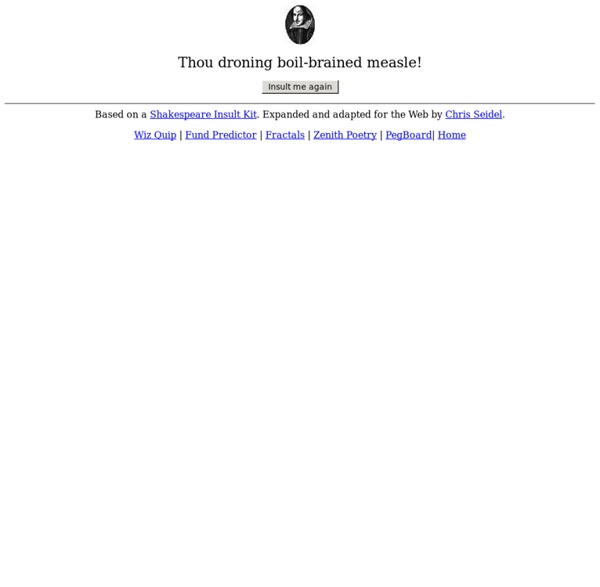



A Quick Guide to Reading Shakespeare Probably the number one complaint about reading Shakespeare is that it doesn't always read like "normal" English. It's a natural and legitimate accusation. Shakespeare wrote for an audience over 400 years ago. Think about how word meanings and expressions change over a relatively short time; four centuries bring with them a lot of alterations. For instance, the history of literary English is the history of invasions, with Celtic supplanted by Anglo-Saxon, which was usurped by Norman French (and accentuated with Latin). The Elizabethan era was a particularly volatile growth spurt in the English language. So how can a reader today bridge that gap between then and now? Word Usage First and foremost, there have been numerous vocabulary changes in English since Shakespeare was writing. Grammar This is where the flexibility of Shakespeare's English is often most apparent. Wordplay Some of the most difficult passages of Shakespeare occur when the Bard is purposely playing with language.
The Seven Ages of Man William Shakespeare The Seven Ages of Man William Shakespeare All the world’s a stage, And all the men and women merely players; They have their exits and their entrances, And one man in his time plays many parts, 5 His acts being seven ages. At first the infant, Mewling and puking in the nurse’s arms; And then the whining schoolboy, with his satchel And shining morning face, creeping like snail Unwillingly to school. And then the lover, 10 Sighing like furnace, with a woeful ballad Made to his mistress’ eyebrow. Making Meanings First Thoughts 1. Shaping Interpretations 2. 3. 4. 5. 6. Extending the Text 7. Challenging the Text 8. Back to the Table of Contents
Norm Goldblatt Absolute Shakespeare - plays, quotes, summaries, essays... Shakespeare's Sonnets Brian Malow | Earth's Premier Science Comedian | Science Co Shakespeare's Sonnets Absolute Shakespeare - plays, quotes, summaries, essays... A Textbook Example of What's Wrong with Education | Edutopi A former schoolbook editor parses the politics of educational publishing. Some years ago, I signed on as an editor at a major publisher of elementary school and high school textbooks, filled with the idealistic belief that I'd be working with equally idealistic authors to create books that would excite teachers and fill young minds with Big Ideas. Not so. I got a hint of things to come when I overheard my boss lamenting, "The books are done and we still don't have an author! I must sign someone today!" Every time a friend with kids in school tells me textbooks are too generic, I think back to that moment. Textbooks are a core part of the curriculum, as crucial to the teacher as a blueprint is to a carpenter, so one might assume they are conceived, researched, written, and published as unique contributions to advancing knowledge. In fact, most of these books fall far short of their important role in the educational scheme of things. Welcome to the Machine Credit: Monte Wolverton But wait.
Shakespeare Bookshelf Comedies Histories Poetry Tragedies The titles in the listing above link to the editions from the 1914 edition of The Oxford Shakespeare at Bartleby. The Complete Works of William Shakespeare from Jeremy Hylton at MIT are also available. For further online Shakespeare texts in other locations and formats and Shakespeare commentary, go to the Shakespeare Section of the ipl2 Resources by Subject collection (Arts & Humanities > Literature > Authors > Shakespeare) or search on Shakespeare in the ipl2. For criticism and other information on Shakespeare and his works, go to the Shakepeare Section of the ipl2 Literary Criticism Collection. For an annotated guide to scholarly Shakespeare resources on the Internet, we recommend the excellent Mr. To search the full text of Shakespeare's works, use The Works of the Bard. For a handy guide to monologues found in Shakespeare's works, use the Shakespeare's Monologues site.
Online Shakespeare Course: Shakespeare After All with Harvard Faculty Marjorie Garber, PhD, William R. Kenan Jr. Professor of English and American Literature and Language and of Visual and Environmental Studies, Harvard University This free online Shakespeare course focuses on Shakespeare’s later plays beginning with Measure for Measure and ending with The Tempest. Building on the discussions of individual plays in Marjorie Garber’s book Shakespeare After All, this course takes note of key themes, issues, and interpretations of the plays, focusing on questions of genre, gender, politics, family relations, silence and speech, and cultural power from both above and below (royalty, nobility, and the court; clowns and fools). Designed as part lecture-presentation and part discussion, this is a course that is meant to be interactive, taking up topics generated by students as well as by the instructor. The lecture videos The Quicktime and MP3 formats are available for download, or you can play the Flash version directly. Introduction Troilus and Cressida Othello